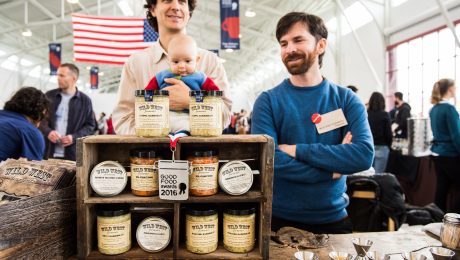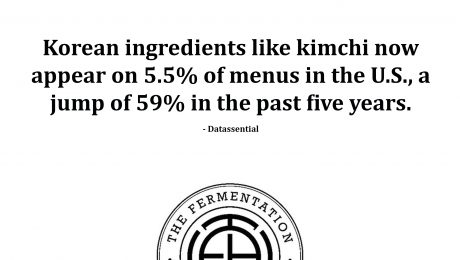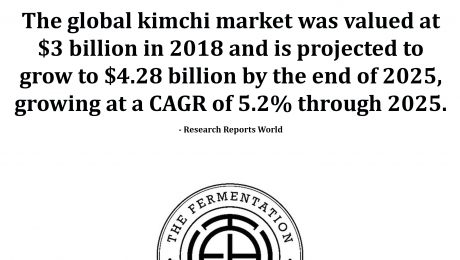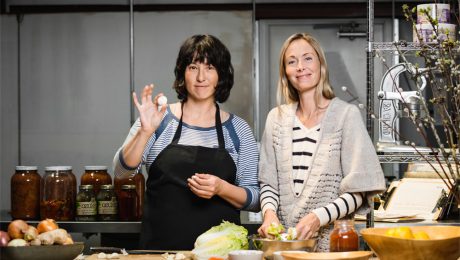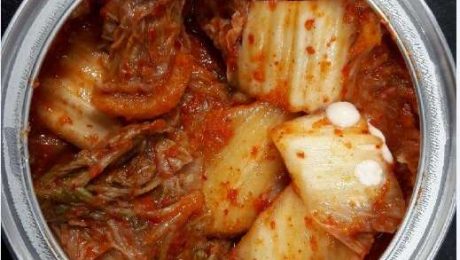More Brands Aim to Create Community Around Fermentation
More fermentation brands are creating ways to connect with their customers, face-to-face. Harvest Roots Ferments started in 2012 as a small farm in Birmingham, Ala. “At the time, Lindsay was fermenting kraut and kombucha for our farmers market table. Our customers wanted ferments way more than kale,” said Pete Halupka, who runs Harvest Roots Ferments with Lindsay Whiteaker. “About three of four years ago, we committed fully to fermentation. Now we produce kombucha, kraut, kimchi and other fermented vegetables and sell them across Alabama.” Now Harvest Roots Ferments is opening Birmingham’s first kombucha taproom. No longer traditional farmers (they source from local farmers, buying 75,000 pounds of produce since 2015), Harvest Roots Ferments is looking to build and connect to the Birmingham community that has helped their business grow. Halupka continues: “We love community in all forms—from the microbial community in action fermenting our products to the community found in our Southern forests and our human community across Birmingham—and we want our space to be a reflection of this.”
Read more (BHam Now)
- Published in Business
Break Out the Kimchi: Study Finds Spicy Kimchi Cures Baldness
Spicy kimchi cures baldness and thickens hair, according to a new scientific report published in the World Journal of Men’s Health. Researchers from Dakook University in South Korea studied men in early stages of hair loss who consumed a kimchi probiotic drink twice a day. After a month, hair count increased from 85 per square centimeter to 90; after four months, hair count increased to 92. Results were even faster and prevalent for female patients with hair loss, who went from an average of 85 hairs per square centimeter to 92 after one month. Hair thickness also increased. This is exciting research for people suffering from hair loss; the kimchi and probiotic product is a natural, safer alternative to hair regrowth drugs. Current hair regrowth drugs have adverse side effects, like irregular heartbeat, weight gain and diarrhea.
Read more (World Journal of Men’s Health)
- Published in Science
Deadline for Good Food Awards Extends to Tomorrow
The deadline for the annual Good Food Awards has been extended until tomorrow, August 2. The Good Food Awards invites food producers from across the country to submit their beer, charcuterie, cheese, chocolate, cider, coffee, confections, elixirs, honey, oils, pickles, preserves, preserved fish, spirits, pantry items, snacks and – new this year – grains! (Grains, you ask? We’re talking grits, rice, quinoa tortillas, pasta and more!) Click here to apply.
Award winners from 2019 featured multiple fermented products, like Forward Roots Fermented Vegan Kimchi Sauce, St. Benoit Creamery Plain Yogurt, Elevate Grain Naturally Fermented Beer Grain Crackers, Blue Bus Cultured Local Kraut-chi, Civil Ferments Ethiopian Sauerkraut, Little Apple Treats Original Apple Cider Vinegar, Barrel Creek Provisions Cucmbers, Lindera Farms Apple Cider Vinegar, Gold Mine Natural Food Co Organic Probiotic Golden Kraut, Hex Ferments Sauerkraut, St. Pete Ferments Jackfruit Kimchi, Oly Kraut Local Spicy Garlic Sauerkraut, Real Pickles Organic Garlic Dill Pickles & Organic Garlic Kraut.
Read more (The Good Food Awards) http://bit.ly/2ysMWed
(Photo by: Good Food Awards of 2016 winner, Wild West Ferments)
- Published in Business
Eating Well Publishes 7 Must-Eat Fermented Foods for Healthy Gut
Dietician Lisa Valente writes in Eating Well the seven must-eat fermented foods for a healthy gut. Her list features: sauerkraut, kimchi, kefir, kombucha, miso, tempeh and yogurt. She writes: “Fermented foods are a hot health topic—and for good reasons. These good bacteria—particularly those in our gut—may improve digestion, boost immunity and help us maintain a healthy weight. Research is still emerging on just how important these mighty microbes might be for our health, but the early results are promising. Take care of your gut, and in turn, it will take help take care of you.”
Read more (Eating Well)
- Published in Health
Korean Ingredients — Like Kimchi — Appear on 5.5% of U.S. Menus
Korean ingredients like kimchi now appear on 5.5% of menus in the U.S., a jump of 59% in the past five years. – Datassential
- Published in Business
Fermentation Reigns: Sour Taking Over Our Tastebuds
Sour is taking over our taste buds. A New York Times Style Magazine article explores how sour flavor is “dominating our dining discourse.” The article lists fermenting, kombucha, sourdough, kimchi, drinking vinegar, cocktail shrubs and sour beer as evidence of sour’s ascent in American’s palates. Samin Nosrat, author of the book of cohost of the Netflix series both titled “Salt, Fat, Acid, Heat,” says acid is one of the building blocks of flavor and makes our mouth water. “...your body gets confused — maybe I want more?”
Read more (New York Times Style Magazine)
- Published in Food & Flavor
World’s Best Female Chef Always Stocks Her Fridge with Ferments
Chef Daniela Soto-Innes — who runs New York City’s top modern Mexican restaurants Cosme and Atla — has been named the World’s Best Female Chef, by the same group that names the World’s 50 Best Restaurants. The 28-year-old is the youngest recipient. A fan of fermentation, Daniela says her fridge is always stocked with ferments (“like kimchi and different types of bacteria, to help with digestion”). She serves a unique variation of tepache at her restaurants, a lacto fermented beverage made with pineapple rind, piloncillo and canela.
Read more (Wall Street Journal)
- Published in Food & Flavor
Global Kimchi Market Valued at $3 Billion
The global kimchi market was valued at $3 billion in 2018 and is projected to grow to $4.28 billion by 2025, growing at a CAGR of 5.2% through 2025.
- Published in Business
Ozukè Founder: Fermentation Will Change Diet & Planet
Blending ancestral kitchen traditions and new scientific research will allow fermentation to change our diet — and our planet.
In a TEDx Talk, Mara King, co-founder of fermented food store Ozukè, shares why she is proudly releasing trillions of good bacteria into the population. Her food philosophy rubs against everything the Food and Drug Administration and state health departments practice. While government agencies enforce strict sanitation standards in the name of protecting American’s food, King preaches that it’s wiping out good bacteria and dumping more toxins into the environment.
When King and co-founder Willow King (no relation) opened their Colorado-based food business, a food scientist from the Denver office of the Health & Human Services Department performed a safety inspection. The food expert was confused by Ozukè’s live, fermented pickles, sauerkraut and kimchi. King: “He said ‘Your product is so weird. We follow all these FDA guidelines in food manufacturing in order to diminish bacteria and here you are making it on purpose.’”
“The food we make is actually super, super, super safe, unlike mots processed packaged fresh foods,” King says. “The reason this food is so safe is not because I’m better at this antimicrobial Macarena than anybody else. It’s because the bacteria are doing the work of making the fermented foods pretty much bomb proof.”
Though numerous cultures have been fermenting for generations (“It’s how humans have been eating raw, crunchy vegetables all through hard winters.”), King notes it’s only in the last 10 years that scientists have been able to map the complex fermentation process. By letting bacteria thrive in its own ecosystem, it “creates a food that’s no longer harmful to humans” and makes a more nutritious product.
“Nature does not operate in a vacuum and neither should we,” King says. “We need to understand the complexity of the world in which we live, then we can start to come up with solutions that do honor our heritage.”
King, who great up in Hong Kong, says older Chinese women store an impressive knowledge of food and medicine. Merging ancient tradition with new science is what will create the living solutions needed to continue living on our planet.
“In fermentation, we have a little trick that we use which is called using a started culture or a mother. I believe that our starter culture…is our human cultural history,” King says. “Once we start tapping this information…we’ll start to come up with amazing solutions, solutions that grow, solutions that rot, solutions that breath.”
Today Ozuke (which means “the best pickled things” in Japanese) still makes pickled veggies, but also teaches fermentation workshops. For more information, visit their webpage.
- Published in Food & Flavor, Health
Study: White Bubbles on Kimchi are Yeast, Not Mold
Ever thrown out a jar of kimchi because of those pesky white mold bubbles? Fear not – it’s not mold, it’s yeast! Researchers say just skim it off, rinse the veggie, heat it and it’s totally safe to eat. The World Institute of Kimchi (WiKim) released a study on the hygienic safety of the yeast strains that form on kimchi, a report which was published in the Journal of Microbiology. WiKim General Director Dr. Jaeho Ha said the study is significant because “it is a step forward toward the alleviation of the anxiety for hygienic safety of kimchi.”
Read more (Phys.org)
- Published in Science



